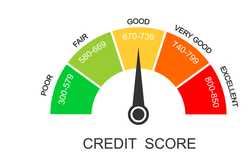8 Reasons Your Credit Score Dropped and 6 Ways To Fix It


Our evaluations and opinions are not influenced by our advertising relationships, but we may earn a commission from our partners’ links. This content is created by TIME Stamped, under TIME’s direction and produced in accordance with TIME’s editorial guidelines and overseen by TIME’s editorial staff. Learn more about it.
Your credit score may seem like three insignificant digits, but those numbers can affect your ability to apply for a loan or credit card. If your credit score is good, you probably don’t give it too much thought—but a sudden drop will likely be cause for alarm.
There are several reasons your credit score could drop, some of which are within your control and others that are not. Learn more about why your credit score could be dropping, and what you can do to improve it once you’ve identified the reason for the drop.
Not sure what caused the sudden drop in your credit score? It’s likely due to one or more of the following scenarios.
One of the most common reasons for a decreased credit score is a missed payment. Your payment history accounts for 35% of your FICO Score and around 40% of your VantageScore. If you allow a payment to go 30 days past due, the delinquency will be reported to the major credit bureaus, resulting in a credit score drop. After 60 to 90 days, the drop will be even more severe.
Credit cards are ideal for large or unexpected expenses, like home repairs or emergency medical bills. But making a large purchase on a credit card decreases your credit utilization, which can in turn have a negative effect on your credit score.
Credit utilization is the amount of your available credit that you’re using. In general, you should aim to keep your credit utilization below 30%; any higher than that can decrease your credit score. For example, if your total credit limit across several cards is $10,000, your overall balance shouldn’t exceed $3,000.
When you apply for a new loan or line of credit, the lender will run a credit check as part of the application process. There are two types of credit checks: a soft check that won’t affect your score, and a hard check that will. The lender runs the latter check while processing your application. This means applying for a credit card or loan can cause your credit score to drop slightly.
There’s nothing quite like the feeling you get when you finally pay off a loan. Whether it’s a car loan, personal loan, student loan, or mortgage, seeing the balance at $0 can give you a major dopamine hit. Unfortunately, there is also a downside. Paying off a loan can reduce your credit score.
Credit scoring models like to see a mix of installment loans and revolving credit on your report. If you pay off a loan, it removes an installment loan from your credit mix and can have a detrimental effect on your credit score. The effect can be felt especially hard if the loan you extinguished was your only one.
Another factor credit scoring models use to determine your credit score is length of credit history. If you close a credit card—especially one you’ve had for a long time—it can shorten your credit history, leading to a drop in your credit score.
If you use your credit card responsibly, you may be eligible for a credit limit increase. Conversely, using it irresponsibly may cause your credit card provider to reduce your credit limit. If that were to happen, your credit utilization would increase and you’d very likely see your credit score drop.
When lenders report credit activity to the credit bureaus, there’s a chance they will make a mistake. If you notice something on your credit report that looks out of place, you can file a dispute with the credit bureaus and with your lender. If it turns out to be a mistake, the lender and credit bureaus will correct the issue.
A sudden drop in your credit score can often be explained by something you have done—or forgotten to do—such as paying your credit card bill late. If you’re certain you haven’t done anything to cause the drop, it’s possible you’ve been a victim of identity theft.
Your credit score can take a hit if someone uses your identity to apply for several credit cards or loans. If this happens, it’s important to act quickly by placing a fraud alert on your credit profile with one of the three major credit reporting bureaus (the bureau you file with will alert the other two, so you don’t have to file multiple alerts).
After alerting one of the credit reporting bureaus, you should fill out an identity theft report and submit it to the Federal Trade Commission (FTC). You can also freeze your credit, which means lenders won’t be able to access your credit file to run a report. Afterwards, however, you’ll need to remove the freeze if you legitimately apply for a loan or line of credit.
Whether you’ve noticed a drop in your credit score or are just looking for ways to boost it, there are several actions you can take to improve your standing with creditors.
Payment history is the most influential factor on your credit score. That’s why it’s so important to make payments on time, whether it be credit card bills or everyday expenses such as housing, utility bills, and medical bills.
To ensure you’re making payments on time, set up automatic payments whenever possible. That way, your bills will be paid without you needing to remember when they’re due.
You can also use an app, such as Cushion, to keep track of your upcoming BNPL payments and organize your bills—you can pay them via the virtual Cushion card and even sync them to your calendar. The Cushion app reports your payments to the major credit bureaus, which helps bolster your overall credit score.

if your credit limit is $10,000, that doesn’t mean you should charge $10,000 worth of purchases to your card. Credit scoring models want to see your credit utilization at or below 30%.
Not every credit card you own necessarily needs to be under 30%. If you have three credit cards with a limit of $5,000 each, your total credit limit is $15,000. You might split up your purchases as follows to stay within 30% total utilization.
| Credit limit | Credit balance | Utilization percentage | |
|---|---|---|---|
Card 1 | $5,000 | $500 | 10% |
Card 2 | $5,000 | $3,000 | 60% |
Card 3 | $5,000 | $900 | 18% |
Total | $15,000 | $4,400 | 29.3% |
If you have high balances on your credit cards, paying down those balances can help improve your credit score. As previously mentioned, you want to keep your credit utilization below 30%, so prioritize paying balances down if your utilization is too high. As your balances decrease, your credit score should start to increase.
It can be wise to have at least a couple of credit cards to your name, although applying for new ones could temporarily knock your credit score down slightly. That doesn’t mean you can never apply for a new card, but try to limit it.
If you see a card with excellent rewards that can get you more cash back than your current card, apply for it. Just don’t apply for too many cards in a short amount of time, as this can raise red flags on your credit report.
A thin credit file can prevent your credit score from improving. Creditors want to see evidence that you are sensible with your money, making payments on time, and not carrying huge balances.
If you are not borrowing much, creditors aren’t going to get a full picture of your financial behavior. With two or three credit cards and one or two installment loans (such as a mortgage and a car loan), your file will be thicker and there will be more evidence that you are a reliable debtor. As long as you continue to make payments on time, your credit score should start increasing.
Credit monitoring can help you keep a close eye on your credit report and identify any activity that affects it. Monitoring can also help you catch any issues, such as identity theft, early. If you do notice anything untoward on your credit report, you can act fast to rectify the issue before it has a chance to seriously tank your credit score.
There are plenty of companies that offer credit monitoring services. Examples include Experian and myFICO.
A drop in credit score tends to incite more panic than is warranted. If the drop was caused by a simple mistake, you can take precautions to stop it from happening again. Signing up for a credit monitoring service can help you quickly identify issues with your credit report so you can work on getting back to a number you’re comfortable with.
In general, a good credit score is anything over 700—but the exact answer depends on the scoring model. The two main scoring models, FICO and VantageScore, have the following ranges.
FICO Score
VantageScore
There isn’t one credit score that car loan lenders use. It will depend on the lender, and you likely won’t know which score the lender is using until you apply for a loan.
However, there is a specific FICO Auto Score that some auto lenders will use. This score is based on a regular FICO Score and adjusted to determine the likelihood of the borrower repaying an auto loan as promised.
The answer to this will depend on the card for which you’re applying. The best rewards credit cards often require borrowers with good or excellent scores. Those with lower credit scores usually have to settle for a card with fewer rewards. If your credit score is poor or fair, you may need to apply for a secured credit card in order to build credit before you will be approved for a traditional credit card.
The information presented here is created by TIME Stamped and overseen by TIME editorial staff. To learn more, see our About Us page.



